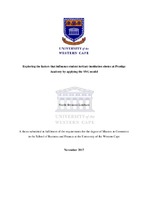| dc.description.abstract | The research presented in this thesis seeks to understand consumer behaviour which addresses
the challenges faced by a private higher education institution (PHEI) named Prestige Academy
in Cape Town. This thesis drew on past research including the legislation governing secondary
schools and private higher education institutions (PHEIs) in South Africa, marketing in tertiary
institutions, understanding consumer behaviour, brand management of tertiary institutions and
its impact on student institution choice. The study aimed to explore the factors that influenced
student tertiary institution choice by evaluating the impact of the Sheth, Newman and Gross
(SNG) consumption model which consist of functional value, conditional value, social value,
emotional value and epistemic value on a student's decision to attend or not to attend the
institution in question. This study followed descriptive research and employed a quantitative
research method. A non-probability sampling type was applied by means of quota sampling.
The study included a sample of 71 registered first year students at Prestige Academy and 55
registered Grade 12 pupils that attended the Prestige Academy Winter Workshop during 2017.
Data was collected from the first year students by means of web-based questionnaires via
Google Forms and from the Grade 12 pupils through printed self-administered questionnaires.
Multiple indicators were used to measure the impact of each consumption value on student
tertiary institution choice. Data analysis were conducted for both the sampled first year students
and the Grade 12 pupils. The results indicated that functional value had the greatest impact on
the sampled respondents' decision to attend Prestige Academy, followed by emotional value,
social value and conditional value. Based on the analysis of the first year students and the Grade
12 pupils, epistemic value did not influence and will not influence the sampled respondents'
decision to attend the institution. By understanding students' needs, the marketing
administrators of Prestige Academy are able to employ effective marketing strategies by
communicating relevant information to prospective students when selecting an institution to
further their education. | |

